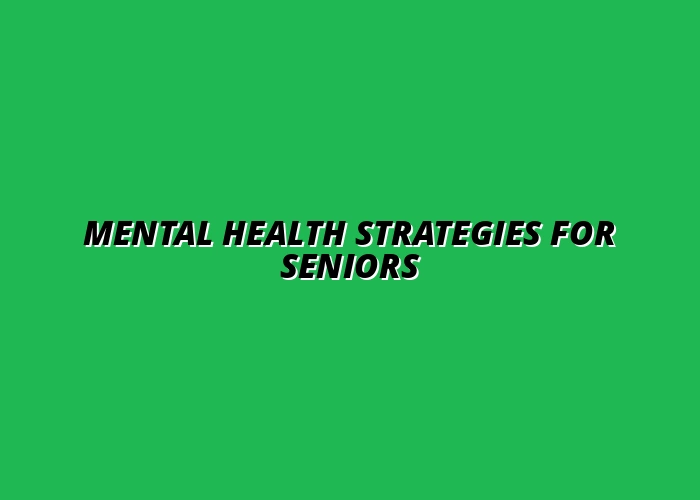Mental Health
Stress and Anxiety: Can lead to cognitive decline.
Depression: Impacts memory and thinking skills.
Prioritizing mental health improves cognitive function.
Join the Vital Aging Hub community and receive expert insights, holistic health tips, and inspiring stories directly in your inbox. Let's thrive together!
Posted on: 2025-09-10
By: Elena Hartwell
What if the secret to enjoying your golden years lies in your cognitive health? As we age, our mental well-being directly influences our quality of life. Understanding this connection is essential for thriving in later years.
Understanding the various factors that influence cognitive health can empower individuals to make informed choices as they age.
Stress and Anxiety: Can lead to cognitive decline.
Depression: Impacts memory and thinking skills.
Prioritizing mental health improves cognitive function.
Physical Activity: Regular exercise enhances brain health.
Healthy Diet: Nutrient-rich foods support cognitive function.
Engagement in activities boosts mental sharpness.
Isolation: Can lead to cognitive decline.
Community Engagement: Enhances emotional well-being.
Strong social ties improve cognitive resilience.
Cognitive health is vital as we age, and it plays a significant role in our overall well-being. Maintaining a sharp mind not only enhances our daily lives but also helps us maintain independence and enjoy our golden years to the fullest. At Vital Aging Hub, we firmly believe that understanding cognitive health is essential for empowering adults over 50 to thrive in this exciting phase of life!
Have you ever wondered why some individuals seem to navigate aging with grace while others struggle? The answer often lies in the intricate connection between mental health and cognitive function. By recognizing the relationship between these two aspects, we can better appreciate the importance of nurturing our minds as we grow older.
Did you know that mental health and cognitive function are closely intertwined? When we prioritize our emotional well-being, it can have a direct positive impact on our cognitive abilities. This connection means that by improving our mental health, we can help preserve our memory, focus, and overall brain function.
Here are some key points about the connection between mental health and cognitive function:
As we age, there are several challenges that can impact our cognitive health. From lifestyle changes to health conditions, these hurdles can be daunting. However, recognizing these challenges helps us find effective strategies to combat them!
Common challenges faced by older adults include:
Awareness of these challenges is the first step toward addressing them. By focusing on proactive measures, adults over 50 can take charge of their cognitive health, paving the way for a vibrant and fulfilling life ahead!
Here's a brief recap of the key points discussed so far:
Cognitive health plays a vital role in our overall well-being, especially as we age. It's essential to take proactive steps to maintain and enhance our mental capabilities. At Vital Aging Hub, I believe that by integrating holistic strategies into our daily routines, we can significantly improve our cognitive function and mental health. Here are some effective strategies that I find particularly impactful:
By focusing on these areas, we can create a stronger foundation for our cognitive health. Each step we take can lead to meaningful improvements in our daily lives!
Taking control of our cognitive health is truly empowering! I encourage everyone to embrace proactive measures that can enhance our mental well-being. Here are some ideas to consider:
As we navigate this journey of aging, remember that every small step counts. With the right mindset and resources, we can thrive!
Community is at the heart of our well-being, and it’s essential to connect with others who share similar goals. Engaging with like-minded individuals can offer both support and inspiration. I invite you to share your thoughts and experiences with cognitive health!
Let’s create a supportive space where we can exchange ideas and tips for enhancing our cognitive function. Here’s how you can contribute:
By sharing our experiences, we not only support each other but also build a community that thrives together!
Are you ready to take charge of your cognitive health? I urge you to start implementing these strategies today! Whether it’s through physical activity, mental exercises, or social engagement, each step you take is a move towards a healthier mind.
In today’s digital age, we have access to numerous resources that can aid in maintaining our cognitive health. Consider exploring online support groups and telehealth services tailored for adults over 50. These platforms can provide:
By tapping into these resources, we can foster a culture of support and empowerment for all! Together, let’s embrace the journey of aging with vitality and joy!
Here is a quick recap of the important points discussed in the article:
Cognitive health is crucial for maintaining independence, enhancing quality of life, and ensuring mental sharpness as we age.
Regular physical activity, brain challenges, a healthy diet, and maintaining social connections are effective strategies to enhance cognitive function.
Mental health and cognitive function are closely intertwined; improving one can positively impact the other, helping preserve memory and focus.
Older adults may face challenges such as social isolation, chronic health issues, and the side effects of medications that can negatively impact cognitive abilities.
Engaging with community support groups and sharing experiences can provide motivation, guidance, and a sense of belonging, all of which are beneficial for cognitive health.

 What if the secret to feeling happier in your golden years lies in giving back? Research shows that
What if the secret to feeling happier in your golden years lies in giving back? Research shows that
 Have you ever considered how financial wellness can shape your retirement experience? The pathway to
Have you ever considered how financial wellness can shape your retirement experience? The pathway to
 What if a simple habit could enhance your cognitive function and overall vitality as you age? Hydrat
What if a simple habit could enhance your cognitive function and overall vitality as you age? Hydrat